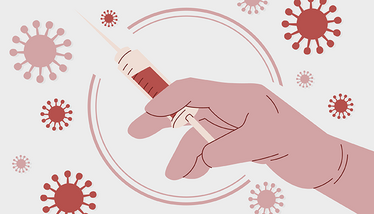One Vaccine to Rule Them All
Can we protect patients against multiple healthcare-associated infections in a single shot?
Jamie Irvine | | 2 min read | News

Healthcare-associated infections (HAI) are an ever-present concern. Statistics suggest more than 90,000 lives have been claimed in the US alone from HAIs, with costs reaching into billions of dollars (1). Today, approximately one in 31 hospital patients falls victim to these infections, and though progress has been made in preventing various types of HAI, there is still much work to be done.
Standard infection treatments are limited because most HAIs are caused by pathogens that have developed resistance to antimicrobials – but could vaccines offer a ray of hope? Possibly – with a caveat. “Even if there were such vaccines, multiple vaccines would have to be deployed simultaneously to protect against the full slate of antibiotic-resistant microbes that cause healthcare-acquired infections,” said Brian Luna, an assistant professor of molecular microbiology and immunology at the University of Southern California (USC), in a press release (2).
Change could be on the horizon, however, as USC researchers recently reported promising data from preclinical in vivo studies focused on a vaccine designed to shield patients from multiple nosocomial pathogens at once (3). The study showed that a single dose of the vaccine in mice transformed immune cells into “Incredible Hulk” mode and provided rapid protection against eight different drug-resistant bacteria and fungi.
“It’s like Homeland Security putting out a terror alert,” said senior author Brad Spellberg, Chief Medical Officer at the USC-affiliated Los Angeles General Medical Center (2). “Everybody, keep your eyes open. Keep an eye out for suspicious packages. You’re alerting the soldiers and tanks of your immune system. The vaccine activates them.”
The vaccine contains three ingredients – two are already used in FDA-approved vaccines and the third is a small piece of fungus often found on human skin. The combination was found to effectively stimulate the body’s supply of macrophages against HAIs, curbing the threat of replication.
Even in cases when infections did develop, vaccinated rodent survival times were longer than unvaccinated controls. Moreover, the vaccine took effect within 24 hours, with protection lasting for up to 28 days. According to the team’s testing, only five percent of hospital stays last longer than three weeks, and early data suggests a second shot could extend the protective window for those in the hospital for longer periods.
Moving forward, the researchers hope to receive FDA guidance on the requirements to complete preclinical studies and an Investigational New Drug Application by 2024.
This article originally appeared on our sister brand, ID Transmission.
- Health People 2023, “Healthcare-Associated Infections Workgroup” (2023). Available at: https://bit.ly/3sobUuV.
- L Hopper, “Superbugs including MRSA thwarted by unconventional vaccine” (2023). Available at: https://bit.ly/3Mwvc8k.
- J Yan et al., “A protein-free vaccine stimulates innate immunity and protects against nosocomial pathogens,” Sci Transl Med, 15, eadf9556 (2023). PMID: 37792959.
Associate Editor, The Medicine Maker



















